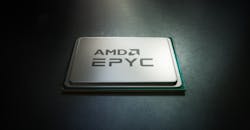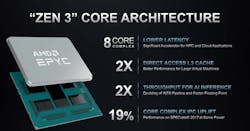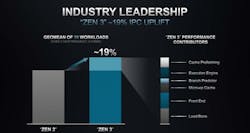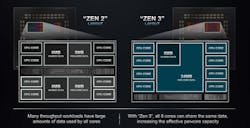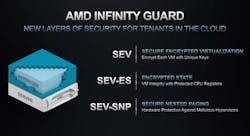AMD Puts More Pressure on Intel With New Epyc Server CPUs
Advanced Micro Devices rolled out its latest line of central processing chips for servers with big boosts in performance and security, raising the bar in a battle with Intel over data centers.
The Santa Clara, California-based company said the Epyc 7003 series of server processors double the performance of Intel’s Xeon server CPUs while running cloud, supercomputer, and other workloads in data centers. The new generation of chips, code named Milan, includes 19 models with up to 64 cores, 128 PCIe Gen 4 ports, and prices from around $900 to $7,890.
AMD said the server processors are all based on its state-of-the-art Zen 3 architecture. It has upgraded the underlying CPU over the previous-generation Zen 2, and it has also enlarged the shared cache memory in the CPU, giving it a generational leap of 19% in instructions per clock cycle (IPC). These improvements also result in slightly faster clock speeds for the Epyc CPUs.
The Zen 3 CPU at the heart of the server chips is based on same 7-nanometer node as the previous generation Zen 2 CPU. The new chips also have the same I/O and memory speeds.
"These processors extend our data center leadership," Forrest Norrod, senior vice president and general manager of the data center and embedded business unit, said in a statement. He said the third-generation Epyc CPUs are the fastest server processors in the world for both public cloud and private data centers in terms of performance per-socket and core.
The server processor at the front of the family, the Epyc 7763, integrates 64 cores that run up to 128 processes at the same time and are clocked at base speeds of 2.45 GHz. The flagship server chip can increase its clock speed up to 3.5 GHz in boost mode, and it consumes up to 280 W of power (TDP), according to AMD.
The memory subsystem in the CPU is based on a huge 256 MB shared L3 cache and 8x DDR channels that operate at up to 3.2 GHz. It also integrates 128 lanes of PCIe Gen 4.
AMD said the Epyc 7003 series integrates up to 64 cores, which are manufactured by TSMC on up to eight compute die based on the 7-nanometer node. The components are packaged around the centrally-located, 12-nanometer I/O die and communicate over AMD's proprietary die-to-die interconnect. These chiplets are assembled in a multi-chip module (MCM) package.
AMD said that based on its internal tests the Epyc 7763 server processors offers up to 106% more performance than comparable Intel CPUs when running certain workloads in the cloud.
AMD said that it upgraded the Zen 3 architecture so the CPU cores are arranged in clusters of eight cores each. AMD also enlarged the L3 memory cache that is shared by all of the CPU cores to 32 MB, up from 16 MB. That means every core in the CPU can directly access the shared memory pool without traversing the die to access data in other caches, said AMD.
This is a big improvement over the Zen 2 core design. The shared L3 cache in Zen 3 serves as a central archive where the cores store data used to carry out processing chores. By giving the cores the ability to access one another's data, the compute die can communicate more efficiently and with less latency. That results in a performance gain for cloud, enterprise, and other server workloads.
Linley Gwennap, principal analyst at The Linley Group, said the performance gains in its latest server chips give AMD the lead over Intel's Xeon CPUs in single-threaded performance. “Even the older products, code named Rome, lead Xeon in core count and multicore performance, so the new Milan generation wins a clean sweep in server performance," he said in a report.
But he cautioned that many of the server processors in the family burn through more power than their predecessors. That has dampened its performance-per-watt gains, Gwennap said.
AMD said the Epyc 7003 CPUs are "pin-compatible" with its previous generation, simplifying system design. The chips can also be used in both single- and dual-socket servers, and unlike Intel’s latest generation of Xeon Scalable CPUs, they are all socket compatible with each other. The Zen 3 architecture at the heart of the CPUs also underpins AMD's latest chips for PCs.
Other improvements in the Eypc 7003 CPUs are in security. AMD said that it integrated an advanced set of hardware security features called Infinity Guard targeted at cloud providers.
That includes what AMD called its "shadow stack" technology, which is designed to defend against attacks that seek to steal data by taking over trusted software running on the server and turning it into a double agent. The shadow stack feature blocks attacks by identifying signs of tampering in parts of the computer's memory that have information on its internal operations.
AMD is also expanding on the secure encrypted virtualization (SEV) features introduced in its previous generation. The chips add secure nested paging (SNP) technology to reduce the risk of attacks where the hypervisor running on the server is breached. Once the hypervisor's defenses are compromised, attackers are able to access or tamper with data in the virutal machine.
AMD has also raised prices on the new generation of server processors, though the Eypc 7003 series still costs less than corresponding Intel SKUs, industry analysts said.
AMD is supplying the chip lineup to top server manufacturers such as Supermicro, Cisco Systems, Dell Technologies, Lenovo, and HPE as well as leading cloud service providers including Amazon, Microsoft, Google and Oracle. AMD said the server chips will expand the Epyc CPU ecosystem to 400 cloud instances and 100 server platforms by the end of 2021.
The announcement of the EYPC 7003 CPUs places more pressure on Intel, which has been struggling to repel AMD and other rivals in data centers in recent years. Intel, which has more than 90% market share in server processors, has been debilitated by delays in rolling out Xeon CPUs based on a more advanced 10-nm technology. At the start of the year, Intel appointed Pat Gelsinger as chief executive to reboot its strategy and regain its technology leadership.
Mark Papermaster, AMD's chief technology officer, said a new generation of chips based on its Zen 4 architecture and the 5-nm process node, is on pace to come to market in 2022. He said that the company's CPU architecture of the future, Zen 5, is in the design stage, without revealing a final release date. “The AMD product development team is hitting on all cylinders.”
About the Author
James Morra
Senior Editor
James Morra is the senior editor for Electronic Design, covering the semiconductor industry and new technology trends, with a focus on power electronics and power management. He also reports on the business behind electrical engineering, including the electronics supply chain. He joined Electronic Design in 2015 and is based in Chicago, Illinois.
